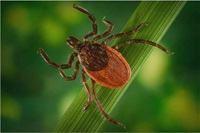
Tick-Borne Encephalitis, as its name implies, is a viral disease associated with tick bites that causes inflammation of the brain and other nervous system structures, such as the lining of the brain (meningitis) and the spinal cord (myelitis). This disease is focally endemic, found in the geographic region extending from western and northern Europe through to eastern and northern Asia. TBE virus is primarily transmitted to humans by infected ticks. The main TBE virus transmission season is during the warmer months from April through November. Ticks are typically found in woodland habitats, including in and on the edges of deciduous forests. The highest risk for TBE is for persons undertaking recreational outdoor activities (e.g., hiking, camping, hunting, foraging, fishing, bird-watching) or who might be occupationally exposed (e.g., forestry workers, farmers, and military personnel).
Since 2001, 20 TBE cases have been diagnosed among U.S. adult and pediatric civilian and military persons who traveled to parts of Europe, Russia and China. Clinical manifestations of TBE virus infection can include febrile illness or neurologic disease, including meningitis (inflammation of the lining of the brain), encephalitis (inflammation of the brain), or meningoencephalomyelitis (inflammation of the lining of the brain, the brain and the spinal cord). No specific treatment is available and management is supportive. Mortality and sequelae (consequences of the disease) rates vary with different subtypes of TBE virus, with mortality rates of 1–20%, and sequelae rates of 10–50%, reported from different areas. TBE vaccines have been available internationally for about 40 years, but until recently no TBE vaccine had been licensed in the United States and prevention has focused on personal protective measures to prevent tick bites.
On Aug. 13, 2021, the Food and Drug Administration approved a TBE vaccine (manufactured by Pfizer as TICOVAC) for use in persons aged ≥1 year. The vaccine is inactivated with a vaccination schedule of three primary doses, and one booster dose administered at ≥3 years after the primary series if there is ongoing risk of exposure. There is an adult formulation for individuals aged ≥16 years and a pediatric formulation for children and adolescents aged 1–15 years with the differences being the volume and the interval between doses one and two, which for adults is 14 days–3 months and for children and adolescents is 1–3 months. The TBE vaccine currently is marketed in about 30 countries, primarily in Europe. The current formulation of the vaccine has been available since 2001, and >75 million doses have been administered in Europe, about two-thirds of those to adults and one third to children.